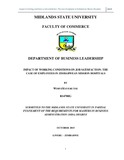Please use this identifier to cite or link to this item:
https://cris.library.msu.ac.zw//handle/11408/2366| Title: | Impact of working conditions on job satisfaction: The case of employees in Zimbabwean Mission Hospitals. | Authors: | Maverutse, Wispa | Keywords: | Working conditions. Job satisfaction. Zimbabwean Mission Hospitals. |
Issue Date: | Oct-2015 | Publisher: | Midlands State University | Abstract: | The study sought to determine the relationship between working conditions on job satisfaction in mission hospitals. The research was influenced by a number of hitches, the first one being the researcher’s past experience in the deterioration and poor health service delivery in the health sector in Zimbabwe. Secondly, the need to investigate on the human resource management issues leading to high attrition rate in the health sector. It was realized that there is lack of understanding and recognition that organization staff is the most treasured resource and significant asset in the health sector. This was seen to be significant in most mission hospitals in Zimbabwe, because a qualified and motivated employee create and deliver value out of the organization recourses hence this tend to benefit both the organization and the patients. In this dynamic and (VUCA) world, a-world characterized by volatility, uncertainty, complexity and ambiguity, health sector organizations endeavour to attract and create right health workforce for the right jobs through constant upgrading of their knowledge and sustaining their motivation in the changing circumstance in Zimbabwe. All health workers value working conditions as indispensable requirements to their job satisfaction. Hence they need systematic investigations to regulate and increase on variables that are significant to improve employee job satisfaction. The purpose of this study was to assess the relationship between working conditions and job satisfaction in Zimbabwean mission hospitals. The study design, covering the purposive sampling of 63 was drawn from 210 employees in mission hospitals in Matabeleland provinces in Zimbabwe. A total of 63 questionnaires were distributed, out of which 46 were returned back after filling. The sampling method selected in this study was purposive sampling where medical doctors, administrators, managers, matrons, sisters in charge and heads of departments were picked on the bases that they were informative and also they possessed the required characteristics for the study. Data was collected using both primary and secondary sources. In this case primary data was collected through the use of questionnaires distributed to all respondents in form of hard copies. Data was analysed using Stata 11, the test applied was the regression correlation of the independent variables of working condition to the dependent variable of job satisfaction. The findings of the study indicates that there is a positive correlation between working conditions and job satisfaction in mission hospitals in Zimbabwe. The research can be beneficial to Zimbabwe Church related hospitals so that they can lobby for the improvement of benefits programs, polices, and remuneration structures to attract, recruit and retain more capable health professional employees for the good of the people of Zimbabwe. | URI: | http://hdl.handle.net/11408/2366 |
| Appears in Collections: | Masters In Business Administration |
Files in This Item:
| File | Description | Size | Format | |
|---|---|---|---|---|
| Maverutse Wispa.pdf | Full text | 1.69 MB | Adobe PDF |  View/Open |
Page view(s)
308
checked on Feb 11, 2026
Download(s)
562
checked on Feb 11, 2026
Google ScholarTM
Check
Items in MSUIR are protected by copyright, with all rights reserved, unless otherwise indicated.



